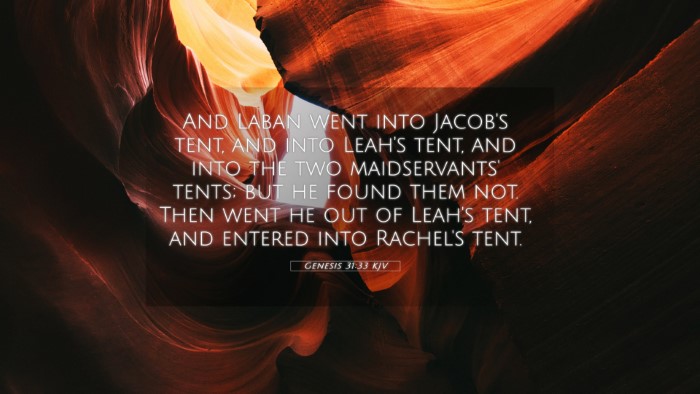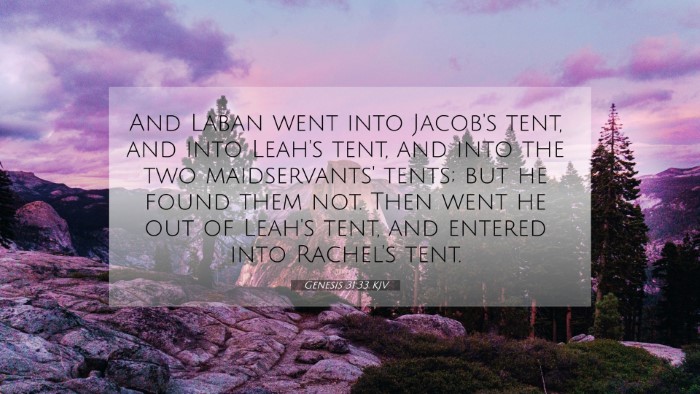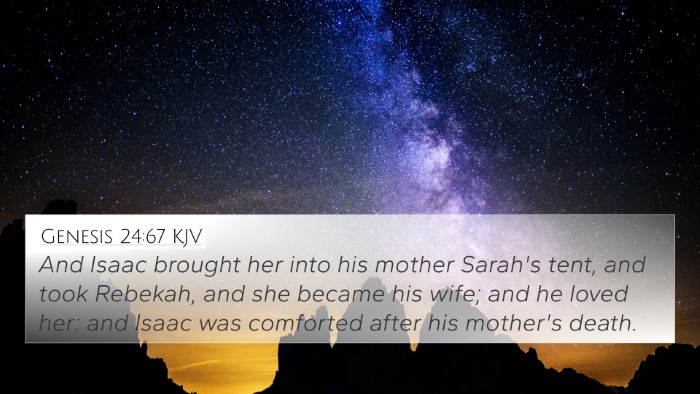Understanding Genesis 31:33
Genesis 31:33 states:
"And Laban went into Jacob’s tent, and into Leah’s tent, and into the two maidservants’ tents; but he found them not. Then went he out of Leah’s tent, and entered into Rachel’s tent."
This verse is embedded in a narrative where Laban, having pursued Jacob, is searching for his stolen idols. The interplay between Laban and Jacob reveals themes of deception, family dynamics, and the pursuit of truth. Understanding this verse requires a look into the context, the characters involved, and the implications of their actions.
Contextual Analysis
This event occurs after Jacob decides to leave Laban's household, having sojourned there for many years. Laban's daughters, Leah and Rachel, represent competing alliances in Jacob's life. The search of Laban signifies a dramatic confrontation, driven by both familial bonds and the tension surrounding Jacob's departure.
Key Characters
- Jacob: The patriarch seeking independence and a promised future.
- Laban: The shrewd father-in-law, emblematic of worldly concern over spiritual progress.
- Rachel: The beloved wife who, in her cunning, hides the idols from her father.
- Leah: The unloved wife whose lineage is tied closely to God's covenant promises.
Thematic Connections
Genesis 31:33 opens the door to several themes:
- Deception: Rachel’s hiding of the idols under her saddle demonstrates the human tendency toward manipulation.
- Family Tension: This search signifies the fracturing of relationships wrought by past grievances and unfulfilled promises.
- Divine Protection: Jacob’s prosperity under Laban is indicative of God’s providential care despite adverse circumstances.
Cross-References to Consider
Understanding Genesis 31:33 is enriched by looking at verses that establish connections and parallels:
- Genesis 29:16-30: The context of Jacob's marriages to Leah and Rachel.
- Genesis 30:1-2: Rachel's earlier jealousy and her desperate attempts to bear children.
- Genesis 31:19: Rachel's theft of the household gods, setting the stage for Laban’s search.
- Genesis 30:43: The prosperity of Jacob amidst the chaotic family dynamics.
- Exodus 20:4: The commandment against idolatry highlights the seriousness of Rachel's actions.
- Matthew 10:36: The tension within families as a reflection of broader spiritual conflicts.
- Genesis 35:2: The call to purify oneself from foreign gods, echoing Laban's lost idols.
Interpretational Insights
Commentators offer varied insights into this narrative:
- Matthew Henry: Emphasizes the spiritual blindness of Laban vs. Jacob's faith journey, suggesting that Laban's search for idols represents a futile chase for what is ultimately superficial.
- Albert Barnes: Notes that Laban's frantic search illustrates the desperation of those clinging to false security, providing a cautionary element within the text.
- Adam Clarke: Highlights Rachel's motivations, suggesting her actions reflect a blend of loyalty to Jacob and rooted cultural practices of idolatry that she was raised in.
Conclusion
Genesis 31:33 encapsulates a complex interplay of familial conflict, divine providence, and the failings of humanity. By exploring this verse and its connections through cross-references, one can gain deeper insights into the spiritual and moral lessons prevalent throughout the scripture.
Further Study Tools
Utilize the following tools for enhanced study of inter-Biblical dialogues:
- Bible Concordance: A valuable tool for finding specific verses and their contexts.
- Bible Cross-Reference Guide: Assists in linking passages that speak on similar themes.
- Cross-Referencing Bible Study Methods: Methods that help locate and interpret related scripture efficiently.




